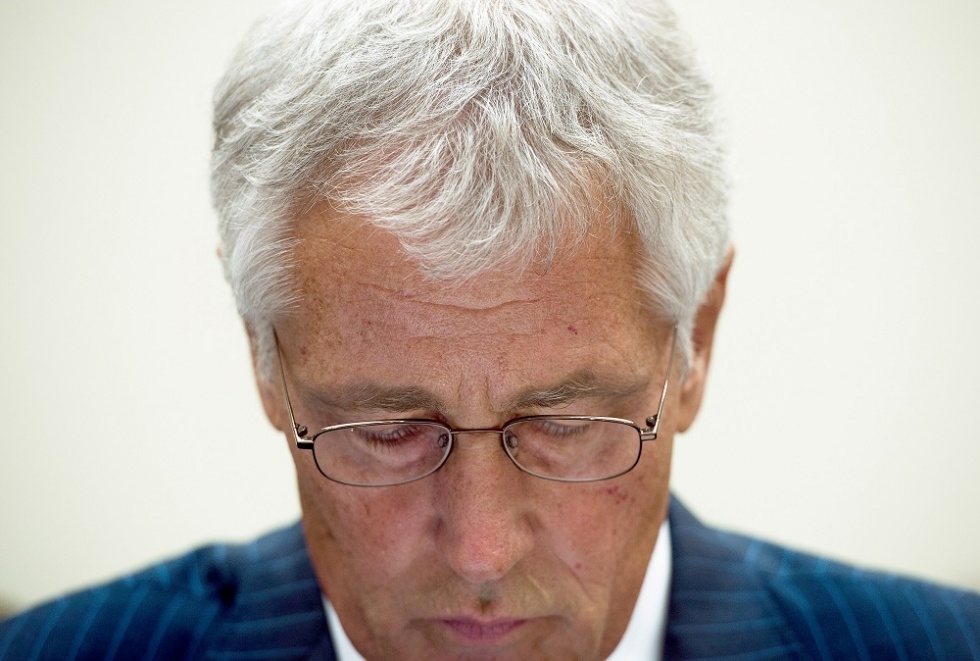US Defence Secretary Hagel resigns

US President Barack Obama has accepted Defence Secretary Chuck Hagel’s resignation, reportedly due to brewing criticism over Hagel’s performance in the battle against the Islamic State group.
Obama made the public statement at a press conference held side-by-side with Hagel and Vice President Joe Biden on Monday afternoon.
News about the former senator and Vietnam War veteran’s resignation, however, was broken earlier in the day by the New York Times which said that Hagel had handed in his letter on Friday. The paper also alleged that the resignation was due to pressure from Obama, who felt that Hagel did not have the right skills to combat a 21st century threats.
According to journalist Max Fisher, writing in Vox, Hagel was asked to go for a number of reasons, ranging from policy failures, to bureaucratic blunders.
On the policy front, Fisher blamed Afghanistan where “Hagel failed to gain enough ground against the Taliban to force them to accept some kind of peace deal; instead, the Taliban sees itself as winning outright and is largely ignoring American negotiators.” He also cited mistakes in Ukraine, which have seen Russian-backed separatists wrangle for control over the eastern parts of the country.
The Middle East, however, is being interpreted as the biggest push factor behind Hagel’s decision to go after less than two years in office.
“In Egypt, Hagel took the lead in trying to convince … Abdel Fatah al-Sisi not to depose Egypt's first-ever democratically elected president in a coup; Hagel failed and the coup went ahead,” Fisher wrote.
“In Iraq and Syria, Hagel failed to devise a strategy that would prevent the rise of [Islamic State] or that would roll it back.”
Administration sources, quoted in the New York Times article, also hinted that issues over the US response to the Islamic State, played a major factor in Hagel’s resignation.
The “the next couple of years will demand a different kind of focus,” one administration official said, speaking on the condition of anonymity.
However, the administration has been keen to stress that Hagel was not fired and that the decision was taken after several weeks of careful discussions with Obama and his team. Hagel will now stay on until a replacement is confirmed and voted in by the Senate.
"In October, Secretary Hagel began speaking with the president about departing the administration ... Those conversations have been ongoing for several weeks," the administration official told the paper.
The White House did not give any clue who might be Hagel's eventual replacement at the Pentagon, but the New York Times cited three candidates.
Former under-secretary of defence Michele Flournoy is said to be in the running, along with Senator Jack Reed of Rhode Island - a former army officer - and former deputy secretary of defence Ashton Carter.
Hagel, as a Republican senator, voted in favour of the 2003 US invasion of Iraq, but later became a critic of the drawn out conflict that ensued – a move that initially brought him close to then senator Obama who was an ardent critic of the war.
The 68-year-old was appointed by Obama in early 2013, and was initially expected to serve for the duration of Obama’s second term. Hagel was the sole Republican on his national security team, and gained a reputation for enacting a string of tough budget cuts that were designed to streamline but also modernise the US military.
In his announcement on Monday, Obama stressed that Hagel’s role had been “critical”, calling his record exceptional.
Hagel has “never lost sight of [the] priorities” and has ensured that our “military is ready for real missions” Obama said.
While seen as a safe pair of budgetary hands, Hagel had come under fire for his apparent lack of confidence in high-level meetings and was criticised within political circles for not presenting his points firmly and not speaking eloquently under pressure.
“In Hagel’s less than two years on the job, his detractors said he struggled to inspire confidence at the Pentagon in the manner of his predecessors,” the New York Times added.
Middle East Eye propose une couverture et une analyse indépendantes et incomparables du Moyen-Orient, de l’Afrique du Nord et d’autres régions du monde. Pour en savoir plus sur la reprise de ce contenu et les frais qui s’appliquent, veuillez remplir ce formulaire [en anglais]. Pour en savoir plus sur MEE, cliquez ici [en anglais].




